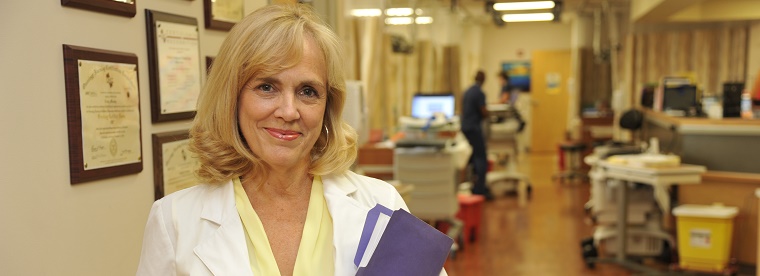Before becoming a nurse navigator, I was a patient myself forging my own personal journey with breast cancer. One of the individuals who helped me was a woman who shared some of her own personal experience with me during a preoperative scheduling appointment - she had also chosen breast surgery.
Being a nurse, having worked in the field for years, I know now it's different when you realize you'll be the one undergoing treatment. However, she understood what I was going through, and she came to see me while I was waiting for the results of my surgery.
She said, "I know you're anxious but we're here for you. Whatever news you get, you can feel good about what you've done so far."
That day was 17 years ago, and at the time, there wasn't as much available in the formal role of navigation.
How a Nurse Navigator Influences the Approach to Care
At MedStar Georgetown Cancer Institute, the nurse navigator is like a lighthouse showing people how to avoid rocks in a vast ocean. Not only am I able to tailor the care to my patient's needs, it's satisfying when I am able to link someone to a resource they didn't know was available. For me, a big part of the satisfaction is having patients know I'm not just there for the good times.
It can be a great comfort for our patients to know there are people who can hear those scary things you're worried about; it's okay to have that conversation. Even the people you love, like family members who are close to you, don't always know what to say.
And then there are those rewarding moments when a patient comes back to me with fantastic news. "I thought I might never walk again, but I'm walking now!"
What I Wish the Public Knew About Nurse Navigators
I think we're still helping people to understand the role of a nurse navigator. In fact, a lot of people — unless someone points them to it — don't even know such positions exist.
Nurse navigators have a great base of knowledge around the standard of care. They can help explain the big picture and the questions that arise. We try to get out in the community as many times as we can, at the level of prevention or early detection. We're there so patients can see and experience what navigation could mean for them.
Empowering People With the Knowledge They Need
My role is all about making sure the patient realizes the support that is available to them early on and across the team — even for the very first suspicious finding. We help to clarify what can be an overwhelming amount of information, helping people understand their specific situation to aim the right treatment plan at it.
We also educate them on how important it is to comprehend the behavior of their cancer. I often explain what cancer staging is, its importance and how easily cancer can be over- or undertreated without all of the necessary information.
I also try to give people the confidence of what's going on behind the scenes — anything they're not aware of, from their point of view. For example, letting them know that a number of specialists such as surgeons, radiation oncologists, medical oncologists, and imaging specialists collaborate to develop the best plan for them. They're looking at the patient’s scans together. They're trying to determine what is best in each individual case. It’s important for me to relay that type of information back to the patient.
The navigation role is very important in helping bring people back to the big picture of quality cancer care. And the patients I see need to know what their newfound situation will mean for their lives and how can they get in control once more.
Sometimes, there are different points in someone’s cancer journey that they have to stop and reevaluate next steps. It's nice for them to know that we'll be there for every stop along the way. And when they get to their next milestone, we'll be there for them, ready to answer their questions.

